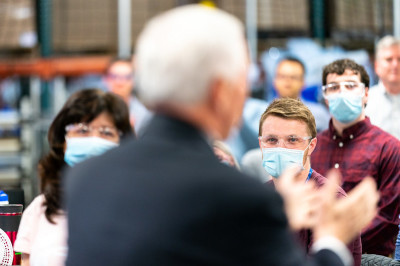‘Secret group of scientists and billionaires’ working to stop COVID-19: The transformative power of unity

The Wall Street Journal broke the story that is now making headlines everywhere: “The Secret Group of Scientists and Billionaires Pushing a Manhattan Project for Covid-19.”
They call themselves “Scientists to Stop Covid-19.” Their group includes chemical biologists, an immunobiologist, a neurobiologist, a chronobiologist, an oncologist, a gastroenterologist, an epidemiologist, and a nuclear scientist. Biologist Michael Rosbash, a 2017 Nobel Prize winner, says that of all the scientists at the center of the project, “There’s no question that I’m the least qualified.”
Their work had not been reported before the Journal article. They are led by a thirty-three-year-old physician-turned-venture capitalist named Tom Cahill. He lives in a one-bedroom rental near Boston’s Fenway Park and owns just one suit. But his connections through his investment firm have made the group’s work possible.
The article describes scientific proposals from the group that are already being discussed or implemented by government leaders. They are now looking at ideas for the post-COVID-19 world.
No one involved with the effort stands to gain financially. Their desire is to add their expertise and connections to the coronavirus battle effort. Stuart Schreiber, a Harvard University chemist and member of the group, says, “We may fail. But if it succeeds, it could change the world.”
A teleconference that impressed me greatly
One of the most hopeful aspects of the pandemic is the fact that the entire world is united in fighting it. Our best minds from around the globe are focused on our common foe. Unlike a war in which nations fight each other, this is a conflict in which our enemy has made us all allies.
We are seeing such collaboration not just in science but across our nation and culture. This is one way God is redeeming this crisis.
Jesus prayed in John 17 that his followers would be united “so that the world may know that you sent me and loved them even as you loved me” (v. 23). As the body of Christ (1 Corinthians 12:27), we obey our head and fulfill his purpose far better when our members are working in unity.
I was asked this week to join a teleconference of Houston-area religious leaders. They crossed all denominational and cultural boundaries. Their common desire was to support and encourage each other as they sought ways to move forward together.
One example that impressed me was their concern for smaller churches meeting in area schools. These schools are closed into the summer, meaning that these congregations will have no place to meet once in-person services begin. So the larger churches began working on ways the smaller churches could use their campuses.
I am convinced that Jesus was smiling in heaven.
Competition and intercession
Our free-market economy is based on competition. The theory is that the more companies and workers compete, the better their products become and the lower their prices. By contrast, I have seen the state-sponsored economy work in Cuba—or not work, I should say. When people own what they make and can advance based on their hard work and initiative, society benefits.
One downside of this competitive environment, however, is that it can so easily foster spiritual independence and conflict. Churches compete with churches for members. Pastors compete with pastors for acclaim and advancement. Church growth can be a zero-sum game: if the new family in our community joins your church, they did not join my church.
I have witnessed such competition across my entire ministry. But the common enemy we face today is being used by God to unify his people in transformative ways. The astounding evangelistic movement I profiled in yesterday’s Special Edition is one result of such collaboration. The pastors in Houston who discussed ways to help smaller congregations are another.
So, here’s my question: As we face the ongoing pandemic, could God’s people be united in prayer more powerfully and intentionally than ever before?
We have responded financially to crises in the past. For example, you were incredibly generous when I asked you to help us raise funds to support those devastated by Hurricane Harvey in my hometown of Houston.
As we face physical, financial, social, and relational challenges unseen in living memory, is there a better time for us to answer Jesus’ intercession for unity through united intercession of our own?
Find a movement and join it
My purpose today is not to announce a prayer movement in response to the pandemic. God has led other believers to do this very thing. Some are centered on 2 Chronicles 7:14 and pray at 7:14 every morning and evening in response. Others are being supported by churches, denominations, and ministries.
The Lord might lead you to find and join such a movement. He might lead you to begin one. He might lead you to ask a handful of other believers to join you in specific intercession for each other and our world. Two believers in agreement are enough to pray in powerful unity (Matthew 18:20).
My purpose is to emphasize the urgency of prayerful unity today and tomorrow. Defeating our viral enemy will require medical and social collaboration. Defeating our even more dangerous spiritual enemy will require spiritual collaboration.
What step will you take to pray in unity today?
Originally posted at denisonforum.org



























